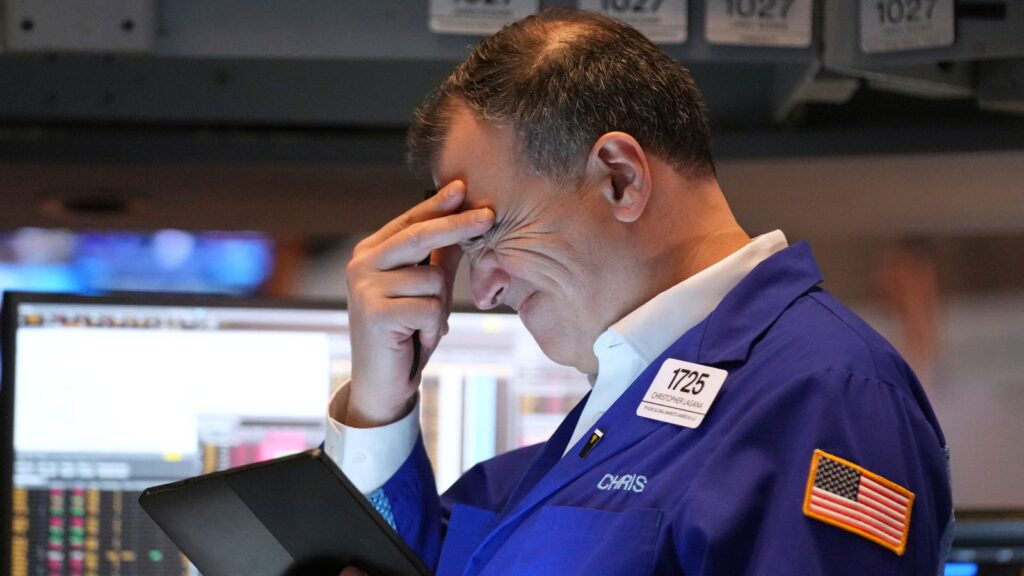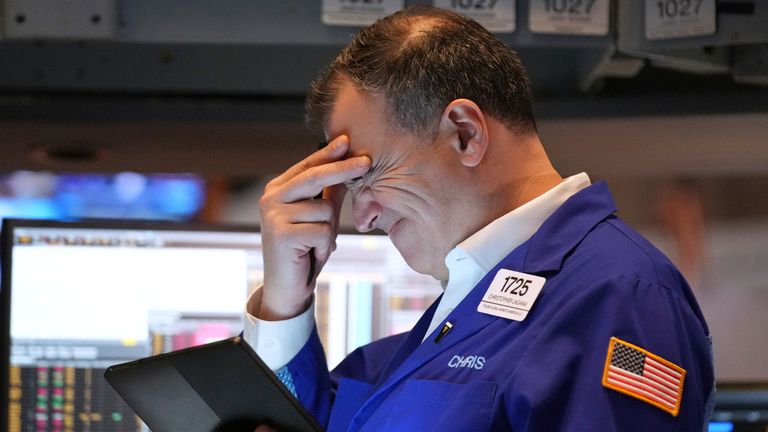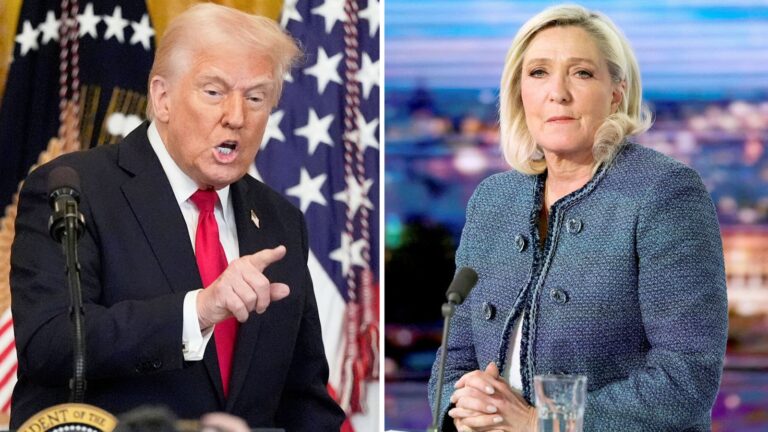

Stock markets around the world fell on Thursday after Donald Trump announced sweeping tariffs – with some economists now fearing a recession.
The US president announced tariffs for almost every country – including 10% rates on imports from the UK – on Wednesday evening, sending financial markets reeling.
While the UK’s FTSE 100 closed down 1.55% and the continent’s STOXX Europe 600 index was down 2.67% as of 5.30pm, it was American traders who were hit the most.
Trump tariffs latest: US stock markets tumble
All three of the US’s major markets opened to sharp losses on Thursday morning.
 Image: The S&P 500 is set for its worst day of trading since the COVID-19 pandemic. File pic: AP
Image: The S&P 500 is set for its worst day of trading since the COVID-19 pandemic. File pic: AP
By 8.30pm UK time (3.30pm EST), The Dow Jones Industrial Average was down 3.7%, the S&P 500 opened with a drop of 4.4%, and the Nasdaq composite was down 5.6%.
Compared to their values when Donald Trump was inaugurated, the three markets were down around 5.6%, 8.7% and 14.4%, respectively, according to LSEG.
Worst one-day losses since COVID
As Wall Street trading ended at 9pm in the UK, two indexes had suffered their worst one-day losses since the COVID-19 pandemic.
The S&P 500 fell 4.85%, the Nasdaq dropped 6%, and the Dow Jones fell 4%.
It marks Nasdaq’s biggest daily percentage drop since March 2020 at the start of COVID, and the largest drop for the Dow Jones since June 2020.
Please use Chrome browser for a more accessible video player
 5:07 The latest numbers on tariffs
5:07 The latest numbers on tariffs
‘Trust in President Trump’
White House press secretary Karoline Leavitt told CNN earlier in the day that Mr Trump was “doubling down on his proven economic formula from his first term”.
“To anyone on Wall Street this morning, I would say trust in President Trump,” she told the broadcaster, adding: “This is indeed a national emergency… and it’s about time we have a president who actually does something about it.”
Later, the US president told reporters as he left the White House that “I think it’s going very well,” adding: “The markets are going to boom, the stock is going to boom, the country is going to boom.”
He later said on Air Force One that the UK is “happy” with its tariff – the lowest possible levy of 10% – and added he would be open to negotiations if other countries “offer something phenomenal”.
Please use Chrome browser for a more accessible video player
 3:27 How is the world reacting to Trump’s tariffs?
3:27 How is the world reacting to Trump’s tariffs?
Economist warns of ‘spiral of doom’
The turbulence in the markets from Mr Trump’s tariffs “just left everybody in shock”, Garrett Melson, portfolio strategist at Natixis Investment Managers Solutions in Boston, told Reuters.
He added that the economy could go into recession as a result, saying that “a lot of the pain, will probably most acutely be felt in the US and that certainly would weigh on broader global growth as well”.
Meanwhile, chief investment officer at St James’s Place Justin Onuekwusi said that international retaliation is likely, even as “it’s clear countries will think about how to retaliate in a politically astute way”.
He warned: “Significant retaliation could lead to a tariff ‘spiral of doom’ that could be the growth shock that drags us into recession.”
Read more:
Do Trump’s ‘Liberation Day’ tariff numbers add up?
Tariffs about something more than economics: power
It comes as the UK government published a long list of US products that could be subject to reciprocal tariffs – including golf clubs and golf balls.
Running to more than 400 pages, the list is part of a four-week-long consultation with British businesses and suggests whiskey, jeans, livestock, and chemical components.
Meanwhile, Prime Minister Sir Keir Starmer said on Thursday that the US president had launched a “new era” for global trade and that the UK will respond with “cool and calm heads”.
It also comes as Canadian Prime Minister Mark Carney announced a 25% tariff on all American-imported vehicles that are not compliant with the US-Mexico-Canada trade deal.
He added: “The 80-year period when the United States embraced the mantle of global economic leadership, when it forged alliances rooted in trust and mutual respect and championed the free and open exchange of goods and services, is over. This is a tragedy.”




